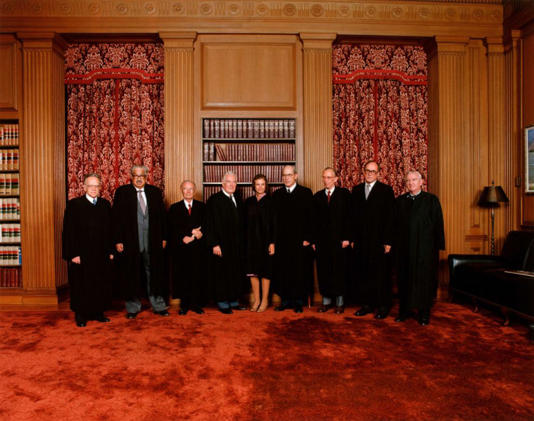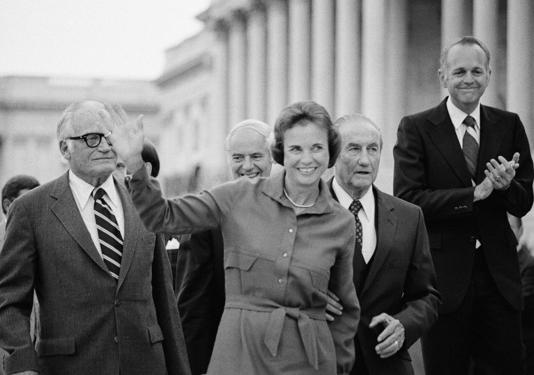first lady on High Court, passes on at 93
Previous U.S. High Court Equity Sandra Day O’Connor, who manufactured a way for ladies in the law, supported philosophical split the difference and taught ages of Americans about the freedoms and obligations of citizenship, has kicked the bucket.The court reported her passing in an explanation Friday morning, refering to “complexities connected with cutting edge dementia, likely Alzheimer’s, and a respiratory disease.” She was 93.O’Connor was the main lady to serve on the country’s most noteworthy court, breaking two centuries of male-ruled statute with broadly praised balance, humankind and freedom.

Antiquarians think of her as perhaps of the most considerable lady in American history.”The law was something male. The High Court was a male spot. Just her presence there as a lady made a huge difference,” said Evan Thomas, O’Connor’s true biographer.
“She was a women’s activist, yet she didn’t call herself that,” said Thomas. “She knew that to coexist with these men who were hanging tight for her to come up short, she must be cautious, and yet extreme and solid. It was a hard equilibrium to strike, however she did.”
Conservative President Ronald Reagan designated O’Connor in 1981 as, “really an individual for all seasons,” a sacred moderate who he accepted would both cement the court’s right-inclining greater part and satisfy a mission vow to put a certified lady on the seat.
“The appropriate job of the legal executive is one of deciphering and applying the law – – not making it,” O’Connor, then 51, said during her affirmation hearing. She was affirmed by the Senate 99-0.
“At the point when she showed up, there were no ladies’ restrooms close to the judges’ gathering room, and they had recently taken out the plaques that said ‘Mr. Equity’ from the workplaces – – however she adjusted rapidly and unhesitatingly,” said Kate Shaw, ABC News High Court investigator and previous assistant for Equity John Paul Stevens. “She came to be darling by her associates.”

While few thought of her as an ideologue, O’Connor was a devoted conservative, embracing the upsides of more modest government, confidence and social traditionalism that the party of the 1980s addressed.
“She came from the nation club wing of the party,” said writer Linda Hirshman, whose book “Sisters by marriage” annals the connection among O’Connor and Equity Ruth Bader Ginsburg. “She had a freedom supporter streak. Be that as it may, Sandra Day O’Connor didn’t have an unmistakable way of thinking
O’Connor broadly showed a freedom and practicality that companions and partners say mirrored her crude childhood on her family’s darling Apathetic B farm in southeastern Arizona.
For over twenty years, O’Connor was many times the definitive decision on a barely separated court. She composed milestone suppositions on early termination and governmental policy regarding minorities in society, and is credited by some – – harshly faulted by others – – for aiding Conservative George W. Shrubbery secure the administration in the challenged 2000 political race.
“It was a hard choice to make,” O’Connor told CNN in 2010 of her vote to hinder extra Florida polling form describes looked for by Fair candidate Al Butchery. “Be that as it may, I really do know this. There were no less than three separate describes of the votes, the polling forms, in the four provinces where it was tested. In not one of the relates would the choice have changed. So I don’t stress over it.”
An Express that makes criminal a person’s strictly persuaded direct weights that person’s free activity of religion in the severest way conceivable,” O’Connor wrote in an agreeing assessment in a 1990 case from Oregon. She didn’t trust the option to free activity was outright, however she contended the bar for states to restrict strict movement was high.
In a barely chosen case in 1984, O’Connor joined the court larger part in maintaining a Rhode Island town’s creche show as a component of its vacation style.
“The presentation of the creche moreover fills a common need – – festivity of a public occasion with conventional images. It can’t reasonably be perceived to pass on a message of government underwriting of religion,” she wrote in an agreeing assessment, proposing an “support test” that the court would utilize broadly in years that followed.
However over the long run, numerous moderates would be frustrated with O’Connor.
In what was then the main test to early termination privileges since Roe v. Swim, O’Connor was the unequivocal vote for a situation confirming those freedoms. In 1992, she joined most of judges to strike down a Pennsylvania regulation that necessary a lady to tell her better half to have an early termination.

On the similarly laden issue of race in school confirmations, O’Connor was comparatively torn. She had worries about the training, however in 2003 got together with the court’s dissidents to save race-cognizant confirmations at the College of Michigan Graduate school.
“With regards to its individualized investigation into the conceivable variety commitments, everything being equal, the Graduate school’s race-cognizant affirmations program doesn’t unduly hurt nonminority candidates,” O’Connor wrote in the assessment on Grutter v. Bollinger.
Simultaneously, she flagged that governmental policy regarding minorities in society ought to brief, state, “We expect that a long time from now, the utilization of racial inclinations will as of now not be important to additional the interest endorsed today.”
She trusted in the legality of capital punishment, however upheld limits on who states could execute, particularly the deranged.
”In the event that measurements are any sign, the framework likely could be permitting a few blameless respondents to be executed,” she said in a discourse in 2001.
Like a large part of the country during her residency, she went through a change on gay freedoms. From the get-go, O’Connor casted a ballot to maintain a Georgia regulation that made homosexuality unlawful. After twenty years, she took the opposite side in a comparable case from Texas, contending that the state’s “uncovered want to hurt” gay people disregarded the fourteenth Amendment’s Equivalent Security Provision.

Especially disturbing to certain ladies’ freedoms advocates was her vote in the 1986 case Meritor Reserve funds Bank v. Vinson. The court consistently asserted the offended parties case of sex separation in the work environment, however held back – – on account of O’Connor’s vote – – in permitting the organization to be expected to take responsibility for the wrongdoing of its representatives.
“O’Connor and Ginsburg, in the years they covered, emerged with similar decision on cases including ladies 95% of the time. Notwithstanding, you will see that frequently she controls for the lady prosecutor for the situation however confines the decision so barely that, in actuality, it doesn’t actually help ladies a ton,” said Hirshman.
Later in her profession, O’Connor turned out to be especially energetic and worried about the job of cash in legislative issues, particularly in legal decisions.
“It transforms decided into these politically-chosen figures in arms races, maybe, by individuals with the resources to help them,” she said in the wake of resigning.
She got together with Equity John Paul Stevens on a 2003 assessment maintaining a milestone redesign of mission finance regulation – – the Bipartisan Lobby Change Act, otherwise called the McCain-Feingold Act after the two congresspersons who composed the bill.
